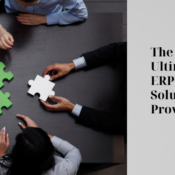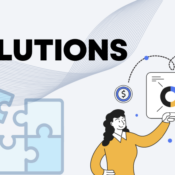Enterprise Resource Planning : Benefits of ERP Software for Small Businesses
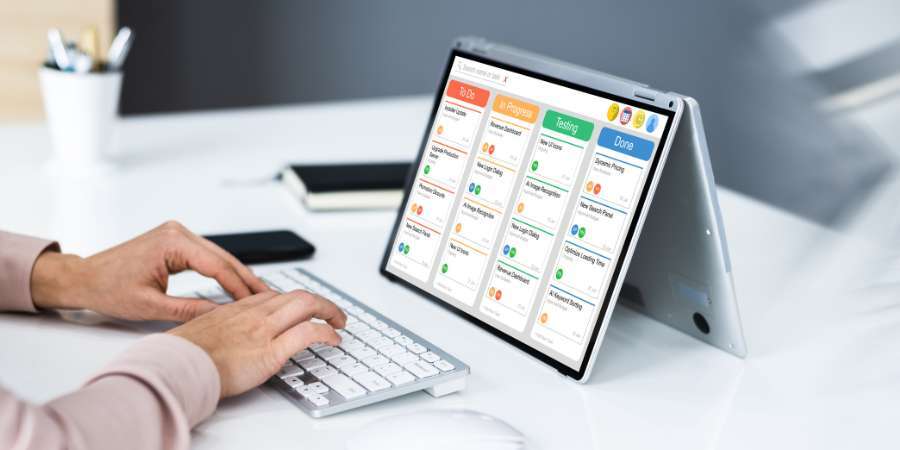
08/04/2023
/
Enterprise Resource Planning : Benefits of ERP Software for Small Businesses
If you are running a small business, you might have heard of the term ERP, which stands for enterprise resource planning. But what exactly is ERP, and how can it help your small business grow and succeed?
ERP is a software system that integrates and streamlines various business processes and data flows across different departments and functions. For example, an ERP system can help you manage your sales, inventory, sales, purchase, human resources, and more from a single platform.
 By using an ERP system, you can benefit from the following advantages:
Data security: An ERP system can protect your valuable business data from unauthorized access, theft, or loss. It can also ensure compliance with legal regulations and accounting standards. You can control who can view and edit your data, and you can also backup and restore your data easily.
By using an ERP system, you can benefit from the following advantages:
Data security: An ERP system can protect your valuable business data from unauthorized access, theft, or loss. It can also ensure compliance with legal regulations and accounting standards. You can control who can view and edit your data, and you can also backup and restore your data easily.
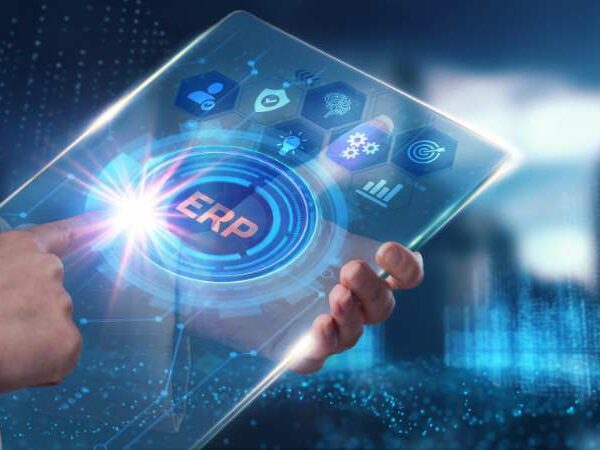 There are hundreds of ERP software options available on the market today. How do you choose the best one for your small business? Here are some factors to consider:
Your business needs: Before you start looking for an ERP software solution, you need to define your business needs and goals. What are the pain points or challenges that you want to solve with ERP software? What are the features or functions that are essential for your business? How do you measure the success or return on investment (ROI) of ERP software?
There are hundreds of ERP software options available on the market today. How do you choose the best one for your small business? Here are some factors to consider:
Your business needs: Before you start looking for an ERP software solution, you need to define your business needs and goals. What are the pain points or challenges that you want to solve with ERP software? What are the features or functions that are essential for your business? How do you measure the success or return on investment (ROI) of ERP software?
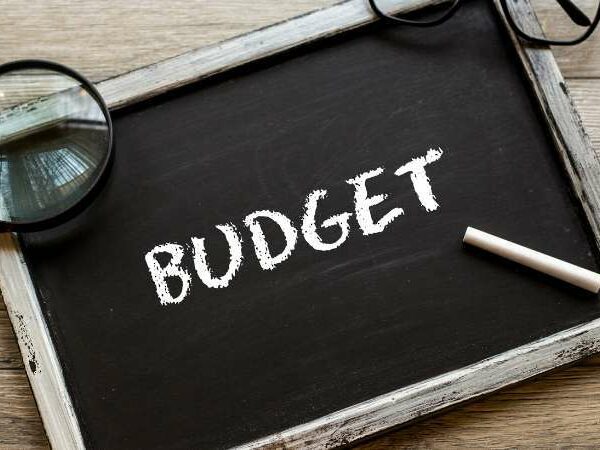 You need to determine how much you are willing to spend on an ERP software solution. You need to consider not only the upfront costs but also the ongoing costs such as maintenance fees, subscription fees, upgrade fees, training fees, etc.
You need to determine how much you are willing to spend on an ERP software solution. You need to consider not only the upfront costs but also the ongoing costs such as maintenance fees, subscription fees, upgrade fees, training fees, etc.
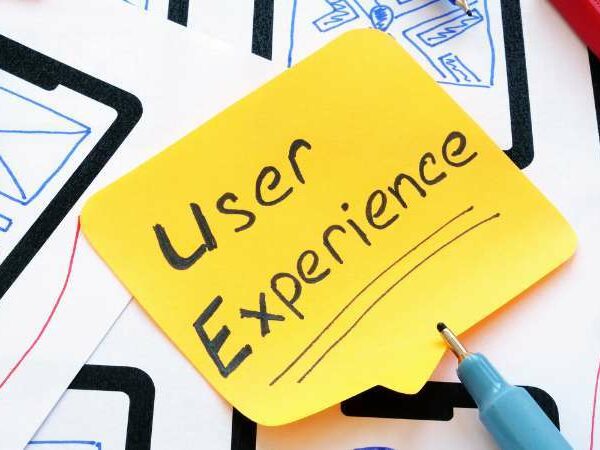 You need to choose an ERP system that suits your specific needs, goals, and budget. One of the best options for small businesses is cloud-based ERP software. Cloud-based ERP software is hosted on the internet by a service provider rather than on your own servers or computers. This means that you don’t have to worry about installing, maintaining, or upgrading the software yourself. You also don’t have to pay for expensive hardware or licenses.
Cloud-based ERP software is also more flexible and scalable than traditional ERP software. You can access it from any device with an internet connection, such as a laptop or a smartphone. You can also adjust the features and functions according to your changing needs. You only pay for what you use.
One option you can check out is Logway. It's a reliable and affordable ERP software that can help you with sales, purchase, inventory, production, and more. You can make it work just for your business. It could make your small business run better and get more done.
You need to choose an ERP system that suits your specific needs, goals, and budget. One of the best options for small businesses is cloud-based ERP software. Cloud-based ERP software is hosted on the internet by a service provider rather than on your own servers or computers. This means that you don’t have to worry about installing, maintaining, or upgrading the software yourself. You also don’t have to pay for expensive hardware or licenses.
Cloud-based ERP software is also more flexible and scalable than traditional ERP software. You can access it from any device with an internet connection, such as a laptop or a smartphone. You can also adjust the features and functions according to your changing needs. You only pay for what you use.
One option you can check out is Logway. It's a reliable and affordable ERP software that can help you with sales, purchase, inventory, production, and more. You can make it work just for your business. It could make your small business run better and get more done.
Benefits of ERP Software for Small Businesses
 By using an ERP system, you can benefit from the following advantages:
Data security: An ERP system can protect your valuable business data from unauthorized access, theft, or loss. It can also ensure compliance with legal regulations and accounting standards. You can control who can view and edit your data, and you can also backup and restore your data easily.
By using an ERP system, you can benefit from the following advantages:
Data security: An ERP system can protect your valuable business data from unauthorized access, theft, or loss. It can also ensure compliance with legal regulations and accounting standards. You can control who can view and edit your data, and you can also backup and restore your data easily.
Scalable production:
An ERP system can automate and optimize your production processes, from planning to execution. It can help you reduce waste, improve quality, and increase productivity. It can also help you adapt to changing customer demands and market conditions.Improved customer service:
An ERP system can enhance your customer service by providing faster response times, better order fulfillment, and personalized communication. It can also help you track customer feedback, satisfaction, and loyalty.Standardized or centralized data:
An ERP system can eliminate data duplication and inconsistency, which can cause errors and inefficiencies. It can also provide a single source of truth for your entire business, so you can access accurate and up-to-date information anytime and anywhere.Custom reporting:
An ERP system can generate reports that show your key performance indicators (KPIs) across every department and function. You can also customize your reports to suit your specific needs and preferences. This way, you can monitor your progress, identify problems, and make informed decisions.Cost reduction:
An ERP system can help you save money by reducing operational expenses such as labor costs, inventory costs, and overhead costs. It can also help you avoid penalties, fines, and lawsuits due to non-compliance or poor quality.Competitive edge:
An ERP system can give you a competitive edge by enabling you to offer better products and services, faster delivery times, lower prices, and higher customer satisfaction. It can also help you innovate and differentiate yourself from your competitors. An ERP system can offer many benefits for your small business. However, not all ERP systems are created equal.How to Choose the Best ERP Software for Your Small Business
 There are hundreds of ERP software options available on the market today. How do you choose the best one for your small business? Here are some factors to consider:
Your business needs: Before you start looking for an ERP software solution, you need to define your business needs and goals. What are the pain points or challenges that you want to solve with ERP software? What are the features or functions that are essential for your business? How do you measure the success or return on investment (ROI) of ERP software?
There are hundreds of ERP software options available on the market today. How do you choose the best one for your small business? Here are some factors to consider:
Your business needs: Before you start looking for an ERP software solution, you need to define your business needs and goals. What are the pain points or challenges that you want to solve with ERP software? What are the features or functions that are essential for your business? How do you measure the success or return on investment (ROI) of ERP software?
Your budget:
 You need to determine how much you are willing to spend on an ERP software solution. You need to consider not only the upfront costs but also the ongoing costs such as maintenance fees, subscription fees, upgrade fees, training fees, etc.
You need to determine how much you are willing to spend on an ERP software solution. You need to consider not only the upfront costs but also the ongoing costs such as maintenance fees, subscription fees, upgrade fees, training fees, etc.
Your deployment option:
You need to decide whether you want an on-premise or a cloud-based ERP software solution. On-premise solutions require you to install the software on your own servers and hardware. Cloud-based solutions allow you to access the software via the internet from any device or location. Each option has its own advantages and disadvantages in terms of security, performance, reliability, scalability, and flexibility.Your integration option:
You need to check whether the ERP software solution can integrate with your existing systems or applications, such as CRM, accounting, e-commerce, etc. You also need to check whether the ERP software solution can support your data migration and transfer processes. Integration is important to ensure data consistency and accuracy across your business.Your user experience:
You need to evaluate the user experience of the ERP software solution. You need to check whether the software is easy to use, intuitive, and user-friendly. You also need to check whether the software offers a mobile or web-based interface that can be accessed from any device or location. User experience is important to ensure user adoption and satisfaction. You need to choose an ERP system that suits your specific needs, goals, and budget. One of the best options for small businesses is cloud-based ERP software. Cloud-based ERP software is hosted on the internet by a service provider rather than on your own servers or computers. This means that you don’t have to worry about installing, maintaining, or upgrading the software yourself. You also don’t have to pay for expensive hardware or licenses.
Cloud-based ERP software is also more flexible and scalable than traditional ERP software. You can access it from any device with an internet connection, such as a laptop or a smartphone. You can also adjust the features and functions according to your changing needs. You only pay for what you use.
One option you can check out is Logway. It's a reliable and affordable ERP software that can help you with sales, purchase, inventory, production, and more. You can make it work just for your business. It could make your small business run better and get more done.
You need to choose an ERP system that suits your specific needs, goals, and budget. One of the best options for small businesses is cloud-based ERP software. Cloud-based ERP software is hosted on the internet by a service provider rather than on your own servers or computers. This means that you don’t have to worry about installing, maintaining, or upgrading the software yourself. You also don’t have to pay for expensive hardware or licenses.
Cloud-based ERP software is also more flexible and scalable than traditional ERP software. You can access it from any device with an internet connection, such as a laptop or a smartphone. You can also adjust the features and functions according to your changing needs. You only pay for what you use.
One option you can check out is Logway. It's a reliable and affordable ERP software that can help you with sales, purchase, inventory, production, and more. You can make it work just for your business. It could make your small business run better and get more done.
Conclusion
If you have a small business and want to improve how it works, ERP software can be really helpful. It can make things faster and more accurate, and it can keep you following all the rules. But choosing the right ERP software can be hard. You need to think about what your business needs, how much you can spend, and how easy it is to use.Recent Posts
Monika Narriya/0 Comments
Why are ERP solutions important in the education sector?
Monika Narriya/0 Comments
Which is the best ERP solution provider company?
Monika Narriya/0 Comments
How do we select the right ERP solution for our businesses?
Sumit Kumar/0 Comments
9 Most In-Demand Programming Languages for 2024
Sumit Kumar/0 Comments
Best Time to Post on Social Media – 2024 Guide
Sumit Kumar/0 Comments
Why You Should Consider Semantic HTML for SEO
All Categories
- Bing
- Blockchain
- Blog
- Branding
- Case Study
- Content Marketing
- Conversion Rate Optimization
- Cryptocurrency
- Digital Currency
- Digital Marketing
- Email Marketing
- ERP Solutions
- Facebook Marketing
- Google Ads
- Google Updates
- Graphic Designing
- Hire Developers
- Image SEO
- Influencer Marketing
- IT
- Local SEO
- Machine Learning
- Mobile Application Development
- Pay Per Click
- Pinterest SEO
- Podcast Hosting
- React JS
- Reddit & Quora
- Search Engine Optimization
- SEO Copywriting
- Social Media Marketing
- Software
- Software Development
- Technology
- UX and UI
- Web Designs
- Web Hosting
- Website Development
- Website Redesigning
- YouTube SEO




